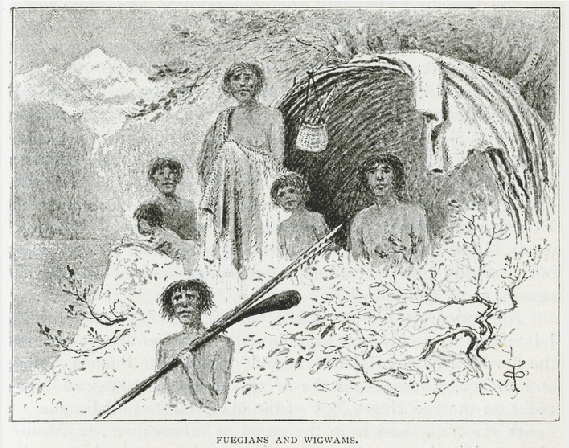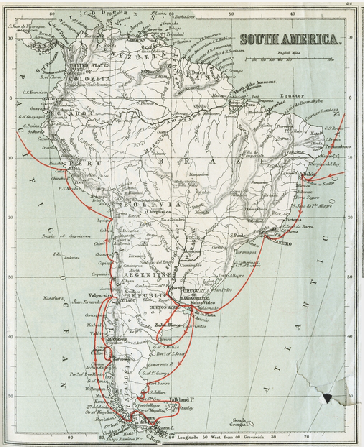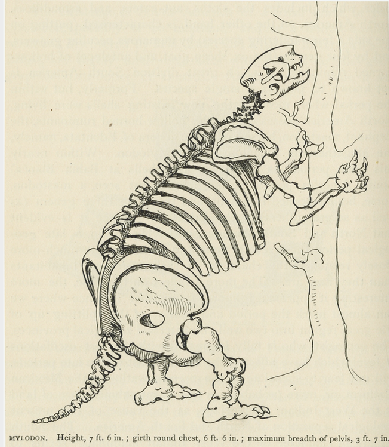In 1835, after nearly four years of botanical, ethnological, paleontological, zoological, and geological observation throughout South America, a little-known twenty-six year old British naturalist named Charles Darwin began to explore and collect samples from the Galapagos Islands, an archipelago off the coast of Ecuador (see source 'Map of tortoise distribution'). He found it interesting that the species of these isles were similar to those of the continent, yet the biota of each island were unique in their details. Odd species such as the flightless cormorant and giant tortoises, as in the source 'Sailor with Tortoise,' made him rethink the meaning of the many fossils he saw and collected throughout South America. Although the bones belonged to extinct species, like the megatherium skeleton in the sources, they were always found near the habitat of extant related ones, such as the smaller tree sloth. It would take another twenty-four years for Darwin to fully appreciate and publicize the significance of these observations, but the 1859 On the Origin of Species would prove to be one of the most influential scientific writings of all time.
Like his hero, Alexander von Humboldt, Darwin found inspiration in the wilderness of Latin America which, at the time, was still largely unknown to North Europeans. He studied the jungles of Brazil, the grasslands of Argentina, the mountains of Chile (where he drew 'fossil sea shells') and all of the peoples he encountered along the way. Even before publishing his theory of evolution, his collections and observations earned him renown as a naturalist, especially in geology, a field in which foreign travel was considered necessary for novel discoveries.
Darwin's international fame came with the publication of On the Origin of Species, which catalyzed a paradigm shift that eventually made a tremendous impact on both the scientific community and Western civilization in general. For one, it challenged long-held notions that humans were God's elect, made to be superior to all other creatures. Once seen as a mere product of evolution from a single primitive ancestor through an ongoing process of natural selection, the primacy of man, and even our permanence as a species, no longer seemed self-evident. Furthermore, Darwinism disproved contemporary racist theories because, as members of evolving populations, each individual is unique, making it impossible to qualitatively classify an entire race (Mayr 1995).
Nevertheless, the term Social Darwinism came to define an ideology of the later nineteenth and early twentieth centuries that claimed society, like nature, would naturally exclude those less fit to thrive. 'Survival of the fittest,' a term coined by Herbert Spencer but largely associated with Darwinian evolution, prompted elitists from Britain to Argentina to legitimize disenfranchising the undesirable groups within their country based on biological laws. Gregory Claeys, historian of political thought, found that the ideologies of Social Darwinism actually existed before The Origins of Species was published, growing not from Darwin, but an intellectual milieu intent on legitimizing imperialism and white superiority. Although proponents of the eugenics movements near the turn-of-the-century cited Darwin to legitimize their belief that whites were the most intelligent people and thus the most fit, their notions had no foundations in Darwin's writings (Claeys 2000).
As in all scientific paradigm shifts, Darwinism was accepted by degrees and various countries received evolution at different times and in different ways. In Latin American and Iberian countries during the 1870s and 80s, Darwinism was the subject of much debate between religionists and positivists, the former promoting divine creation while the latter saw evolution as scientific proof of their ideas about progress. In fact, reformers like Argentina's 'Generation of 1880' used Darwin and Spencer's theories to distance themselves from conservatives. For those promoting the improvement of Latin American society, government, and--less fortunately--race, Darwin was a hero who provided proof that humanity's destiny was inevitably to evolve for the better (Glick 1999).
The fact that Darwinian evolution has been a subject of intense debate and controversy from 1859 until the present day gives credence to just how revolutionary and influential this concept has been. Charles Darwin's innovative and compelling theories, inspired by empirical observations of geology and existing and extinct biota, changed the world forever.
Questions for further exploration:
- Examine a lesser known aspect of Darwin's observations in Latin America, such as geology, paleontology, or ethnography (all of which are partially addressed in this unit's sources). Did this particular part of his work influence his famous theory of evolution?
- What do the satirical cartoons in this topic's sources tell us about Darwin's legacy in the late nineteenth century? How do theses British reactions to Darwinism compare with those of Latin American countries? (See Thomas F. Glick et al., eds., The Reception of Darwinism in the Iberian World for studies of country-specific reactions).
- What forms did the local interpretation of Darwinism and its language take in the modernizing policies of any single Latin American country?
- What were some of the impacts of Darwin's theories on the work of Latin American scientists, such as Carlos Monge Medrano or Bernardo Houssay, the first Latin American to win a Nobel Prize for science?
- Compare Darwinian and Lamarckian evolution: which had a greater impact on social institutions in Latin America?
Further Reading:
Claeys, Gregory. "The 'Survival of the Fittest' and the Origins of Social Darwinism." Journal of the History of Ideas. 61: 2 (April 2000): 223-240.
Darwin, Charles. On Evolution: The Development of the Theory of Natural Selection. Eds. Thomas F. Glick and David Kohn. Indianapolis: Hackett Publishing Company, Inc., 1996.
Glick, T.F. and Miguel Angel Puig-Smaper, and R. Ruiz. The Reception of Darwinism in the Iberian World: Spain, Spanish America and Brazil. New York: Springer Press, 2001.
Herbert, Sandra. Charles Darwin, Geologist. Ithaca: Cornell University Press, 2005.
darwin-online.org.uk
Hopkins, Robert S. Darwin's South America. New York: The John Day Company, 1969.











